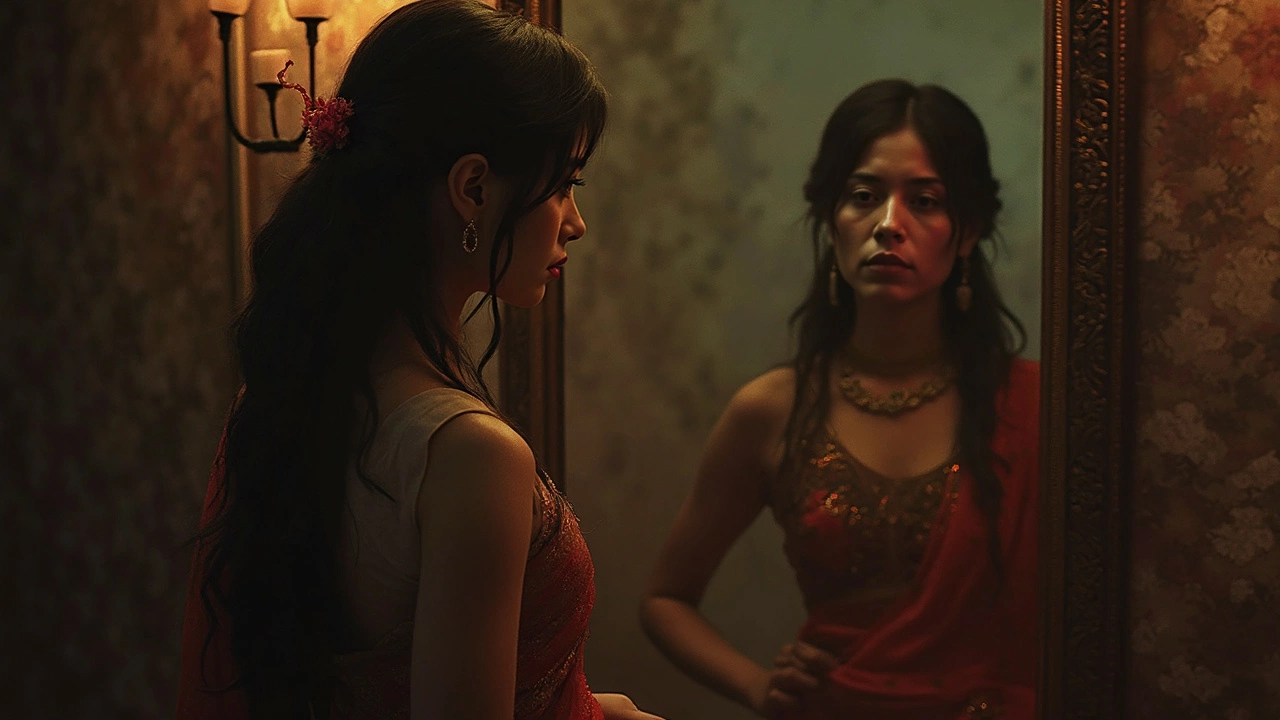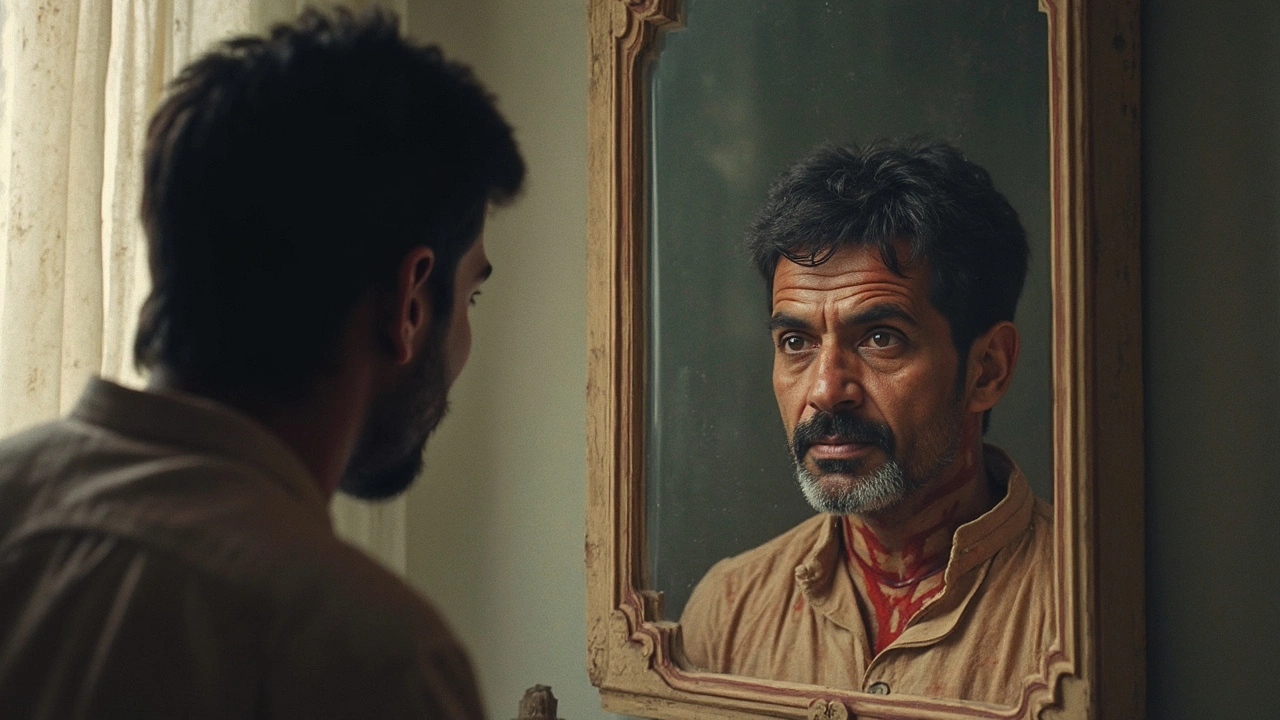Why You Shouldn't Stare at a Mirror for Too Long

Ever found yourself lost in your own reflection, only to snap back to reality wondering where the time went? You're not alone. Staring at mirrors isn't just about a quick check for leafy greens stuck in your teeth or ensuring your hair's on point. It's a whole psychological experience with layers of unexpected effects.
First off, did you know that gazing at yourself for too long can create mind-bending illusions? It's like your brain decides to play tricks on you, giving you a warped version of your own face. Some folks even see faces morphing or disappearing altogether! While it sounds like something out of a sci-fi movie, there are real psychological explanations behind why our brains do this.
Then there's the whole emotional rollercoaster that can come with too much reflection time. Let's face it, mirrors have a knack for highlighting every little perceived flaw, which isn't always great for our self-esteem. Spending too long critiquing our own appearances can spark some negative thoughts, triggering anxiety and stress.
- Mind Tricks and Illusions
- The Science of Self-Reflection
- Psychological Effects
- Tips for Healthy Mirror Interaction
- Cultural Beliefs and Superstitions
- Finding Balance with Mirrors
Mind Tricks and Illusions
Let's dive into the wild world of mirrors and the staring at mirrors phenomenon. Ever wondered why weird stuff happens when you look into a mirror for too long? It's all about how our brains process repetitive and familiar images, and staring at a mirror creates a unique set of circumstances.
One fascinating effect is known as the Troxler effect. After staring at a specific point for just a few seconds, your peripheral vision starts to fade. That's because our brains are great at filtering out unimportant stimuli. So when you're mirror gazing, your peripheral vision might make your reflection appear to warp or even vanish. Kinda freaky, right?
Then there's the 'strange-face illusion.' Psychologist Giovanni Caputo found that people who stare at a mirror for about 10 minutes often see bizarre distortions of their own face—sometimes resulting in a Frankenstein-like appearance. This happens because prolonged staring leads to cognitive processes breaking down, causing the brain to invent creative distortions.
Even more intriguing, some people report seeing faces from their dreams or other recognizable shapes staring back at them. Our brains love patterns and will try to make sense of random neuron firing by creating these sometimes spooky illusions.
These effects remind us of how powerful and mysterious human perception can be. So, if you ever catch yourself getting mesmerized by your own reflection, remember there’s some pretty neat science happening right there!
The Science of Self-Reflection
When we talk about mirror gazing, it's not just a casual check of your reflection. There's a whole science behind how our brains interpret those glassy images. And it's more fascinating than you might think.
The human brain is wired to recognize patterns, especially when it comes to faces. We're visual creatures, and our brains are always busy trying to make sense of what we've seen. But here's the kicker: prolonged staring in the mirror can tweak these patterns. When your brain processes the same image continuously, like your reflection, it sometimes gets 'stuck', leading to weird perceptions like distortions or illusions. Creepy, right?
According to a study about the 'strange-face in the mirror' effect, after about ten minutes of staring, many people experience hallucinations. They might see their face changing shape, looking zombie-like, or even swapping with someone else's! It's not about the mirror being haunted; it's just your brain getting a bit fed up and improvising.
Even more fascinating is how mirrors influence self-awareness. Staring at your reflection can increase your self-reflection, not just physically, but mentally. Suddenly, you're thinking about your traits, decisions, and life choices. A simple glance might spiral into deep thoughts—not always a walk in the park if you're already feeling stressed.
To keep mirror time healthy, experts recommend taking breaks if you find yourself lost in self-critique. It's not just about what you see in the glass but how you let it affect your mind. Keep it casual, and remember, there's a world outside the looking glass that's just as important.
Psychological Effects
You might think that staring at mirrors is just a harmless habit, but it can actually stir up a lot of psychological action, more than you might expect. The more time you spend staring at mirrors, the more likely you are to notice subtle changes that can mess with your mind. One major effect is something called 'the Troxler effect,' where unchanging stimuli tend to fade, causing certain aspects of your reflection to seem to disappear or distort.
This isn't just about strange visual effects. Mirrors can shake up your emotions too. When you fixate on your reflection, it's easy to slip into critiques of your own appearance. This habit can spark a chain reaction that affects your mental health, and not in a good way. Constantly picking apart your appearance might lead to increased anxiety, stress, and in some cases even depression.
On a deeper level, excessive mirror gazing can lead to something known as 'mirror anxiety.' People can develop a preoccupation with imagined defects—this is one of the aspects of body dysmorphic disorder (BDD). While checking your reflection once in a while is perfectly normal, getting caught up in an endless loop of scrutiny can tip you into unhealthy territory.
Besides, an interesting study found most people report feeling worse about their appearance after staring at a mirror for too long. It's a vicious cycle that reinforces negative perceptions about oneself, chipping away at self-esteem over time.
| Duration | Reported Feelings |
|---|---|
| 5 minutes | Neutral |
| 10 minutes | Self-critical |
| 15 minutes | Increased anxiety |
So what's the takeaway here? Keep an eye on how often and for how long you're gazing into that glass. A little self-awareness can go a long way in preventing unnecessary stress and maintaining healthier mirror interactions.

Tips for Healthy Mirror Interaction
Keeping it real with mirrors is more important than you'd think. To ensure you're on the positive side of mirror gazing, here's how you can interact with mirrors without getting caught in negative spirals.
- Set Time Limits: Getting lost staring at mirrors can be easy, so try setting a time limit. For example, stick to 5 minutes per session. It's enough time for your daily grooming or quick check without drifting into obsession.
- Focus on Positivity: When you're in front of the mirror, focus on things you like about yourself. Acknowledging your strengths can enhance your mood and boost self-esteem.
- Mindfulness Practices: Before mirroring, practice a quick mindfulness exercise. Take a couple of deep breaths and set an intention to reflect on reality without judgment.
- Avoid Early Morning or Late Night Staring: During these times, your mind can play tricks, and you might feel more vulnerable. Stick to daytime mirror checks when you're alert.
- Decorative Alternatives: Use mirrors not just for checking out your reflection but also as decorative elements. Framing them with art or placing them to reflect light can create a positive environment.
By sticking to these simple guidelines, you ensure that your interactions with mirrors stay healthy and constructive. Remember, mirrors should be a tool, not a trap.
Cultural Beliefs and Superstitions
Did you know that mirrors have been tangled in superstitions and cultural tales for centuries? They aren't just for checking your reflection, they're steeped in mystery and stories that have been passed down through generations.
One of the most well-known superstitions is the idea that breaking a mirror brings seven years of bad luck. This notion dates back to Roman times when it was believed that mirrors held a piece of your soul. Shattering one supposedly damaged your soul, leaving you with a hefty curse to carry around.
In other cultures, mirrors are seen as powerful tools. In East Asian traditions, for example, mirrors are used in feng shui to reflect positive energy around a space. They're not just decor, they're a way to channel good vibes!
There's also the spooky side. Ever heard of the Bloody Mary challenge? This game, often played at sleepovers, involves chanting 'Bloody Mary' into a mirror in a dark room, in hopes of summoning a ghostly figure. Though it's more of a pastime in Western cultures, it shows how mirrors are linked to the paranormal.
On a lighter note, some Asian folklore suggests that mirrors can ward off evil spirits. People used to bury them with the deceased to protect them in the afterlife.
Mirror gazing also finds a place in spiritual and mystical practices. In some beliefs, staring into a mirror long enough might reveal insights about oneself or even past lives. Intriguing, right?
Whether you're into these tales or not, it's fascinating how something as simple as a mirror can carry so much significance across the world. From psychology of mirrors to spiritual connections, they continue to capture our imagination.
Finding Balance with Mirrors
Finding a healthy balance when it comes to staring at mirrors is all about knowing your limits and being mindful of your emotions. While mirrors do reflect our outer appearance, they should also help us connect positively with our inner selves.
To use mirrors more mindfully, try setting a timer when you need to check yourself out. Spending a focused two minutes is usually enough for most practical needs. If you feel yourself slipping into a marathon staring session, give yourself a reality check and step away. It's not about avoiding mirrors entirely but using them in moderation.
Here's a quick tip: If you're feeling a bit low on self-esteem, avoid focusing on those flaw-hunting reflections. Instead, make it a practice to find one thing you genuinely like about yourself each day. It's a small step, but it can make mirror time more positive.
- Mirror-free Zones: Create spaces in your home where mirrors aren't center-stage. This reduces the temptation to constantly check your reflection.
- Mindful Moments: When using a mirror, complement your reflection with affirmations or thoughts that boost your confidence.
- Time Limits: Limit time spent in front of the mirror to necessities – brushing, grooming – rather than idle staring.
Mirrors are a part of our everyday lives, but making a conscious effort to use them wisely helps maintain your mental health and preserve psychological effects positively.